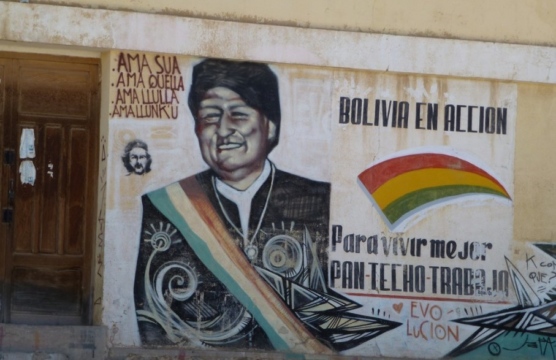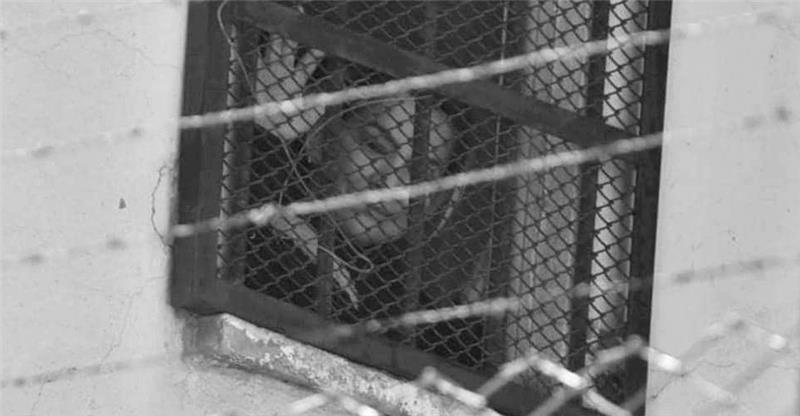
Bolivia’s Morales Contains Corruption Fallout
After a string of corruption scandals, President Evo Morales’ party lost dramatically in regional elections in Bolivia last week.
A Daily Publication of The Dialogue
Bolivian prosecutors on Aug. 20 charged former interim President Jeanine Áñez with genocide, stemming from the deaths of 22 protesters in 2019 after demonstrations erupted over the country’s contested election and Áñez took over. The charges were announced days after an Organization of American States-commissioned report said the Áñez government took power by violating constitutional rules and that security forces committed “summary executions,” “massacres” and “systemic torture’” during Áñez’s rule. Days later, former President Carlos Mesa proposed a reform that he said would guarantee an independent judiciary and promote “reconciliation.” Is Bolivia’s justice system impartial enough to fairly judge Áñez, or is it influenced by politics? Does the country need a judicial reform such as the one Mesa is proposing, and what would such an overhaul entail? How are Bolivia’s polarized politics affecting investment in the country?
Roberto Laserna, director of the Center for the Study of Economic and Social Reality (CERES) in Cochabamba, Bolivia: “Justice Minister Iván Lima recently said that ‘there is not a deadline for the judiciary to be independent.’ He knows how badly managed the judiciary is as he was a magistrate himself during Evo Morales’ administration. President Áñez’s case demonstrates how easy it is for the government to manipulate the system. She was arrested and jailed without the approval of the Legislative Assembly, and the authorities have been throwing one accusation after another at her just to keep her in ‘preemptive custody.’ In Bolivia, there is no accumulative penal punishment, but those accused may spend an indefinite amount of time in jail ‘awaiting trial.’ The justice system is not independent enough to judge her nor any former president. It isn’t even independent enough to solve a dispute between two private parties. It functions neither on the basis of merit nor on legal reasoning, but rather according to political and economic influences. Surveys show that 85 percent of Bolivia’s electorate distrusts the country’s judiciary. A reform can begin by removing the attorney general and appointing by consensus a trusted authority. At the same time, the popular election of magistrates must be removed from the constitution so that experienced, trusted and independent lawyers can be appointed for life, in order to provide them the proper protection. They should also have the power to organize the reform, from professionalization to new procedures and assume control of the budget, which must be increased to provide for the judiciary’s great responsibilities. Such a reform is crucial in order for democracy to survive and for development to blossom, as investments are shrinking due to the decline of the rule of law in Bolivia.”
Kevin Young, associate professor of history at the University of Massachusetts Amherst: “Victims have a right to justice. That’s the main focus of the Aug. 17 report. The report acknowledges deficiencies in the judicial system and makes some sensible recommendations for reform. But it emphasizes that the problems are ‘structural’ and not unique to one party. As Bolivian legal ombudsperson Nadia Cruz says, ‘Bolivia’s population cannot be left without access to justice while these structural issues are resolved.’ Honduras likewise has a flawed judiciary, but no one demands that it overhaul the system and replace all officials before prosecutions can proceed, as the Bolivian right is demanding. Honduras has a right-wing, pro-business government, so it’s treated differently than the MAS government in Bolivia. Áñez also gets special treatment. Carlos Mesa, OAS chief Luis Almagro and the State Department were silent when Áñez was killing and torturing opponents. These players enabled the 2019 coup by crying electoral fraud despite a lack of evidence, à la Trump. The abuses of which some MAS-friendly judges are accused, such as overuse of preventative detention, are minor by comparison. The right’s current indignation is thus hypocritical and seems aimed at skirting accountability. Bolivia has been polarized since before the Spanish conquest. Polarization doesn’t always prevent a society from confronting its problems. Economic growth and poverty reduction were quite impressive under MAS from 2006-2019. This trajectory was disrupted by the coup and Áñez’s austerity policies, and later by the pandemic. Democracy, not unity, is a prerequisite for addressing Bolivia’s serious economic, health and ecological problems.”
V. Ximena Velasco Guachalla, lecturer in the Department of Government at the University of Essex: “Similar to Mesa’s statement, former President Eduardo Rodríguez Veltzé remarked that an impartial and accessible judiciary is ‘essential for reconciliation.’ However, the country’s adherence to the rule of law has further declined in the last few years, going from 0.41 in 2015 to 0.38 in 2020, according to the 2021 WJP Rule of Law Index. The figure ranks the country 121st across 128 countries globally and 29 of 30 in the region. Between 2014 and 2020, the percentage of individuals reporting ‘no trust at all’ in the judicial system increased from 14 percent to 20 percent, according to the 2020 Latin American Public Opinion Project. Citizens’ deep-rooted mistrust is not surprising as the system is characterized by a lack of resources, extensive corruption and judicial misconduct. Its persistent disfunction has made the judiciary into a political weapon: administrations across the political spectrum strategically deploy the law against their political opponents. The politicized use of the law has taken place both under the Morales and Áñez administrations, and more recently the Arce administration. While Arce announced reforms to the justice system soon after his inauguration, the process is now stalled. The rule of law should be a focal point in the coming years if Bolivians are to regain trust in a system that has persistently failed to represent the interests of the population as a whole and has instead been used for the benefit of the administration in place. Without a truly independent and respected judicial system, the country will not be able to adjudicate the entrenched views that fuel conflict.”
Kathryn Ledebur, director of the Andean Information Network in Cochabamba: “The attorney general proposed charges of murder, serious injury followed by death and genocide, defined as anyone ‘killing, injuring, or treating inhumanely all, or part of, an Indigenous or other group.’ The definition includes ‘those directly or indirectly responsible for bloody massacres.’ It’s far from a kangaroo court; the process has checks and balances. Two-thirds of the Legislative Assembly must ratify the charges for the Supreme Court to hear the case. Strong evidence exists. Áñez and her cabinet signed an illegal order exempting the security forces from legal consequences for excessive force against protesters. Undoubtedly, the justice system requires profound reform. Ironically, Mesa’s allies blocked a 2017 attempt. Two-thirds of the Legislative Assembly passed an in-depth law, drafted with input from international legal experts, that addressed many longstanding, structural problems. Protests led by CONADE, Áñez’s party, and doctors, protesting a malpractice article, forced the law’s revocation. It’s striking that Mesa didn’t express concern about the justice system during Áñez’s tenure, during which the same attorney general sanctioned political persecution and failed to credibly investigate massacres and torture. Mesa’s politically neutral successor, Eduardo Rodríguez Veltzé, first proposed a renewed reform in 2020. As he affirms, any credible initiative must start with an in-depth diagnosis of existing flaws and contradictions. Revisiting the revoked 2017 Penal System law would be a good place to start. Yet, the hundreds of victims of the 2019 coup have a right to justice, just as Áñez and her allies deserve due process and a speedy trail. Transparent legal proceedings can’t wait.”
Calla Hummel, assistant professor in the Department of Political Science at the University of Miami: “Observers should remember that Áñez swore herself in as president after everyone in the line of succession resigned and no one had occupied the presidency for days. Article 169 of the Bolivian Constitution of 2009 has three positions in the line of succession: the vice president, president of the senate and president of the Chamber of Deputies. Former President Morales resigned on Nov. 10, 2019, followed by Vice President García Linera, Senate President Salvatierra and Chamber of Deputies President Borda. Áñez swore herself in amid widespread unrest two days later, on Nov. 12. She did not comply with the election clause of Article 169, which states that if the president of the Chamber of Deputies assumes the presidency, they must call elections within 90 days. The session in which she was sworn in also did not meet quorum after many members resigned and others hid. Áñez and her administration were roundly and rightfully criticized for enabling the police and military to open fire on protesters at Senkata and Sacaba and then prosecuting former officials. The Arce administration has since furthered the pattern of prosecuting former officials. This pattern undermines local institutions and governance because it gives current officials a credible fear that they will be prosecuted if their political opponents win an election. This creates incentives to undermine political competition, attack any opposition and never step down from office. The Arce administration should put an end to this pattern and create alliances across parties for reform if the administration wants to deepen Bolivian democracy.”
 The Latin America Advisor features Q&A from leaders in politics, economics, and finance every business day. It is available to members of the Dialogue’s Corporate Program and others by subscription.
The Latin America Advisor features Q&A from leaders in politics, economics, and finance every business day. It is available to members of the Dialogue’s Corporate Program and others by subscription.
After a string of corruption scandals, President Evo Morales’ party lost dramatically in regional elections in Bolivia last week.
Given their close proximity to the United States, LAC countries are well-positioned to capitalize on the surplus of US gas exports and current buyer’s market.
As global oil prices collapsed over the last two years, regional governments have started to lose their leverage in the energy industry. To attract international investors, they must offer increasingly favorable terms, which means ceding more of their own control.
 Former Bolivian President Jeanine Áñez, pictured in jail, faces charges stemming from her rule. But the likelihood of her getting a fair trial is up for debate. // File Photo: @jeanineanez via Twitter.
Former Bolivian President Jeanine Áñez, pictured in jail, faces charges stemming from her rule. But the likelihood of her getting a fair trial is up for debate. // File Photo: @jeanineanez via Twitter.

